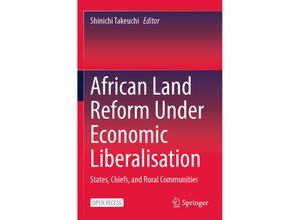This open access book offers unique in-depth comprehensive and comparative analyses of the
motivations context and outcomes of recent land reforms in Africa. Whereas a considerable
number of land reforms have been carried out by African governments since the 1990s no
systematic analysis on their meaning has so far been conducted. In the age of land reform
Africa has seen drastic rural changes. Analysing the relationship between those reforms and
change the chapters in this book reveal not only their socio-economic outcomes such as
accelerated marketisation of land but also their political outcomes which have often been
contrasting. Countries such as Rwanda and Mozambique have utilised land reform to strengthen
state control over land but other countries such as Ghana and Zambia have seen the rise in
power of traditional chiefs in managing the land. The comparative perspective of this book
clarifies new features of African social changes which are carefully investigated by area
experts. Providing new perspectives on recent land reform this book will have a considerable
impact on scholars as well as policymakers.



